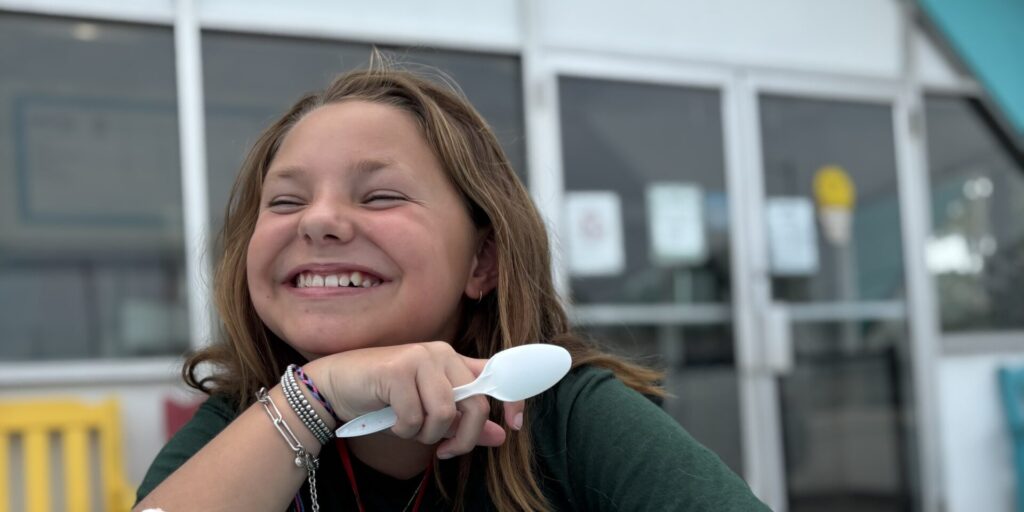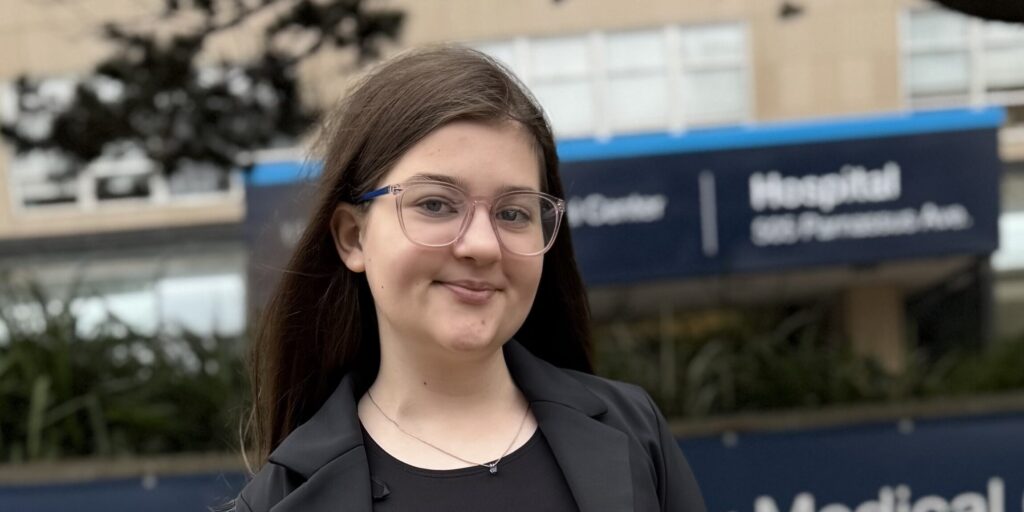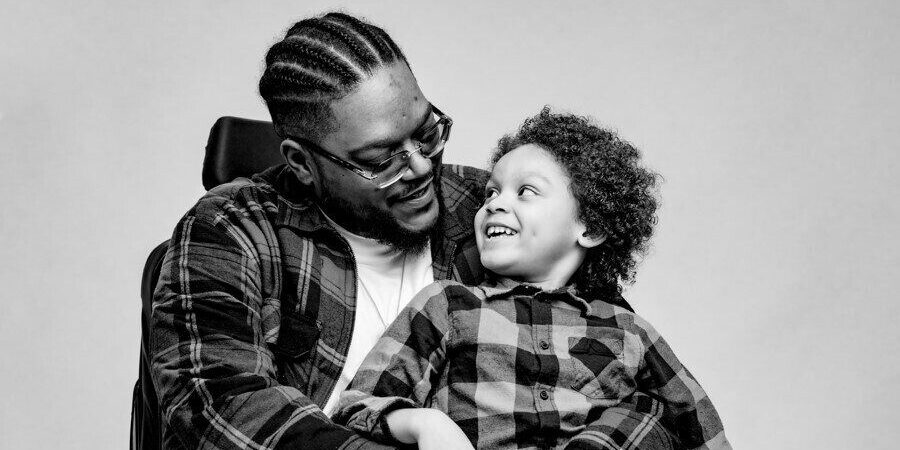
The Joys (and Lessons) of Fatherhood from MDA Ambassadors
By Rebecca Hume | Tuesday, June 10, 2025
As every father knows, parenthood is an incredible journey filled with joy, challenges, victories, growth, and love. For dads living with a disability, raising children sometimes requires extra patience, resilience, and adaptability. In beautiful synchronicity, those very traits are often strengthened through daily life with a disability and serve as an asset to parenting, providing an opportunity to teach and model for their sons and daughters the value of compassion, creativity, and strength.
In celebration of fatherhood, we checked in with six MDA Ambassadors about what they have learned and what they love about being a dad.
Frederick Graves, father of an eight-year-old son, lives with limb girdle muscular dystrophy (LGMD) 2A/R1.
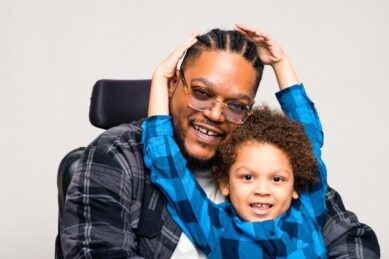
MDA Ambassador Fred Graves with his son Greyson.
“As a dad living with muscular dystrophy, I’ve learned that parenting isn’t about physical abilities, but about showing up, connecting, and leading with love. I’m reflecting on what fatherhood has taught me, the lessons I hope to pass on to my child, and the unique perspective my disability has brought to this journey.
My favorite thing about being a father is watching my child grow and being able to share the things I love with him. It was so exciting to see his face light up the first time he heard “Bad” by Michael Jackson.
Fatherhood has taught me that I didn’t give my dad nearly enough appreciation for all he did. He made being a father look so easy, and I never realized how much it truly took. On a personal level, it’s also taught me to be more mindful of my own self-talk. I’ve realized I was holding onto a lot more self-inflicted ableism than I ever knew. And I’ve learned that kids are always watching and listening.
I focus a lot on communication with my son. The more he understands, the easier it is to get his cooperation. He learned very early on that he’s faster and stronger than me! So, I make communication a top priority.
My disability has prepared me for parenthood in two big ways. First, it’s made me very, very patient. I don’t mind moving at my child’s pace because sometimes he needs to move at mine. Second, it’s made me resilient. If there’s a will, there’s a way!
Three key lessons I want my son to learn from me are: One, that he can do anything he sets his mind to with the right planning and effort. Two, that God loves him. And three, that he has a family that will always be there for him.
The best parenting advice that I ever received was: “Rules without relationship breed rebellion.” I don’t parent from a “because I said so” place. I’d much rather he respect and appreciate my guidance.
When I first became a dad, I focused a lot on what I couldn’t do and how my limitations might affect my son. But I’ve learned to focus more on what I can do, and not on what I can’t. I encourage other dads with LGMD or MD to quiet those negative thoughts. We’re our children’s superheroes, no matter our limits.”
Justin Lopez has a three-year-old son and lives with LGMD 2B.
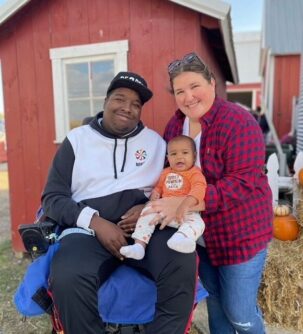
MDA Ambassador Justin Lopez with his wife, Alexis, and their son, Tatum.
“My favorite part of being a father is watching Tatum grow and discover the world around him. He has an incredible curiosity, especially for the little details most people overlook. Once something catches his attention, he dives deep, staying focused until he truly understands it. I love being part of that journey—guiding him, encouraging him, and witnessing those moments of realization. It’s pretty cool to support him as he learns and evolves every day.
Fatherhood has taught me a lot about selflessness and presence. I’ve learned that I’m capable of more love and responsibility than I ever imagined. It’s also shown me how important it is to lead by example: how my actions, even the small ones, shape how my child sees the world. I’ve discovered strengths I didn’t know I had, and at the same time, I’ve learned to embrace my imperfections and keep growing—for both of us.
Living with a disability has challenged me to adapt my parenting style in more mental and psychological ways, especially when physical tasks can be limiting. With Tatum, that means relying more on communication, creativity, and emotional connection to guide and teach him—which can definitely be an uphill battle with a curious and energetic three-year-old. But it’s also helped me become more intentional and patient, and it’s strengthened our bond in unique ways
Without question, living with a disability has taught me patience—and that same patience has become one of my greatest strengths as a father. Managing my disability requires me to approach life slowly and methodically, which translates well to parenting a toddler like Tatum. I’ve learned to accept that things won’t always go right the first time—or even the second or third. But what matters most is showing up consistently, staying calm, and leading with love through every attempt. That mindset has shaped how I support and connect with him every day.
The three key lessons about life that I hope to instill in my child are: One, whatever you do and everything you do, give 110%. Two, be yourself, it will always be enough. And three, be a man of your word.
The best parenting advice I’ve ever received is to avoid comparing yourself to other parents—whether it’s your peers or what you see on social media. Every child and every family is different. Instead, focus on raising a kind, resilient, and thoughtful human being. If you keep that as your guiding principle, everything else will fall into place. Trust and rely on your village to get you through peaks and valleys of parenting
My advice to other parents living with a disability is don’t dwell on what you can’t do—focus on what you can. I know that’s easier said than done, but it’s true. Kids are incredibly adaptable; they’ll adjust to your lifestyle with more ease than you might expect. What matters most is being present, loving, and engaged. Focus on what’s within your control and let go of the rest.”
Kevin Crowley, who lives with Charcot-Marie-Tooth (CMT), is a father of two and author of the My Dad’s Garage blog series.
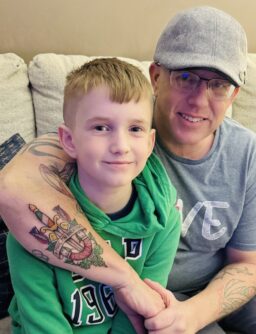
MDA Ambassador Kevin Crowley with his son.
Excerpted from his recent blog about fatherhood, he shares his experience and advice.
“I have so many favorite things about being a father, but my most precious is the fact that with one of my children I had to work, grind, sometimes fight, and I always had to earn my spot in her life. I met my wife Carrie in 2011. Along with her came a sweet, very opinionated, beautiful 12-year-old little girl. Sometimes blending the two of us was much like stirring vegetable oil into water but she turned 26 this year and she is, and always will be, one of my true loves. I’ve grown into Dad and she’s the most perfect daughter I could’ve ever asked for. But, needless to say, we both earned those titles.
With my son, who was born in 2014, I’ve been Dad since day one and there’s nothing he can do about it. While both of my children and I have very different foundations, our end prize is still the same. They are my most precious gifts and I’m their Dad.
They are the most important people in my life and in turn I’ve shifted more focus on my own health and well-being. I’ve found more strength and compassion for my own body and soul than I ever had and I thank my kids for being the reason for that.
The older I get the more my CMT affects me. While the struggles are real, hard, and continuous, I’ve embraced that my mind still functions. While I’m never going to play sports again or run the Boston Marathon, my mind can still coach my own son and so many other youth athletes.
By the time both my children have become adults and have lives of their own, I hope that I have instilled some traits in them that I hold very important. Respect- always respect others and acknowledge that you live in your own shoes, not theirs. Bravery- whether it’s facing your own struggles or fighting for what you feel is right, be brave and more importantly, be brave enough to ask for help. Responsibility- be responsible for your actions and who you are. Be responsible for your own life and commitments!
When my son was on his way, I fretted about everything. Food, diapers, schedules, and generally how in the heck are we going to do this?! A close friend told me, “You’re going to blink, and his childhood will be over and you will have forgotten how you got it done. It’ll happen, don’t stress yourself preparing for it.” That has been the best advice I’ve received on parenthood.
If I had to give advice to other fathers who live with a disability it would be this: know that your children see your strengths, not your disabilities. Many times, I watch and compare myself to other coaches and I get frustrated that I’m not as mobile, not as strong, or maybe can’t keep up physically with some of the younger dads. But if my son needs support and reassurance, he comes to me first. He looks to me for love and protection. At the end of every practice and every game, my son walks out of a crowd of 30 boys and through five other coaches to put himself under my arm. Nothing else matters to him except that I’m his person and I’m his Dad.
Realize that you are that too. Love your children. Support your children. Teach your children. Be Dad and everything else will come.”
Marshall Eckert has a two-year-old daughter and lives with LGMD 2B.
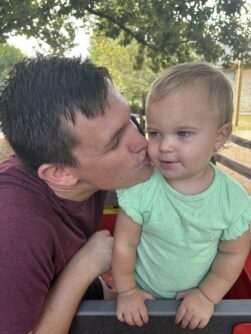
MDA Ambassador Marshall Eckert with his daughter, Estelle.
“My favorite thing about being Estelle’s father is watching her discover the world around her and seeing her realize she has a major role in it.
Fatherhood has taught me that one failure or mistake does not define you. Fatherhood is about the culmination of your efforts. Kids remember your effort and action, not your missteps.
Parenting with a disability can be difficult from several perspectives. First, and probably most obvious, is that I am not physically able to do everything an able-bodied parent might. This means adapting play when possible. It also means leaning on my wife to take over tasks that I may not be physically able to do, like climbing to the top of playground equipment. The second and maybe less obvious adaptation is changing the way I think a parent should show up. My perspective of parenthood came from my lived experience of having two able-bodied parents. I always imagined being able to ride bikes with my kids, go on difficult hikes, or carry them from the car to bed. While this is not the reality, my child’s perspective of a father is me. That means doing what I can and showing up in different ways. I am constantly adapting on the fly, both physically and mentally.
Living with a disability from my perspective is controlling what you can and letting go of what you do not control. This has helped me during my parenting journey because there are things I can control, but a lot that I cannot. My responsibility as a father is to help my daughter in the ways that I can and be with her when things are out of our control (which is difficult for a two-year-old to always grasp).
There are so many lessons that I want to instill in my daughter, but I will try to narrow it down to three: One, you are loved immeasurably more than you can ever know. Two, don’t be afraid to take up space, being your authentic self and bringing your own skills to the table. And three, life if tough, but you are tougher; you can do hard things.
The best parenting advice I have ever received is that the days are slow but the years are fast. Soak up every moment.
My advice to other parents living with a disability is to ensure that you are keeping up with your own physical and mental health. When you are at your best, you can devote yourself to being the best for your child.”
Levi Stanger is father to a four-year-old son and lives with CMT.
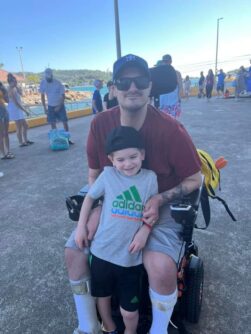
MDA Ambassador Levi Stanger with his son, Landon.
“My favorite thing about being a father is playing with my son and getting to be silly together.
Fatherhood has taught me that I can still be very present in my kid’s life even with my limitations. I play with him from my power chair and have adapted how we can play together. I have my wife set me up with everything he needs and then I can help him.
I already knew that I can do hard things and that has helped me with parenting and figuring out what I need to do to help my son.
Three lessons I hope to instill in my son are: Always work hard. Help other. Have fun.
The best parent advice I have ever received is that you are going to make mistakes but that is how you learn.”
Isaac Banks has three children (ages 7, 9, and 10) and lives with LGMD.
“My favorite thing about being a Dad is hearing my kids say “I love you” unprompted. Any parent knows the struggle of chasing down your kids for a hug or a verbal term of endearment, but when one of my kids comes up to me and hugs me and tells me how much they love me it lets me know that they feel safe, and what more could a Dad want?
Fatherhood has taught me that there is no greater calling for a man. Muscles fade, hair turns gray, and good looks are fleeting, but having a child tell you that when they grow up they want to be just like you is the highest compliment someone can have. I have wanted to be a dad my entire life, and now that I am, I realize I was made for it.
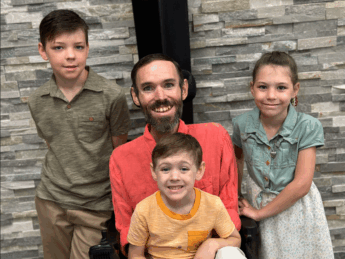
MDA Ambassador Isaac Banks with his children (left to right), AbiYah, UriYah, and Eliana.
Almost every aspect of my parenting has had to be adapted, or at least redirected, through my disability. I am not able to play on the floor, or catch, or take them fishing. I can’t just put them in my van and take them to the park. I have to plan every detail, make arrangements, and seek help, but that is the physical part of parenting. I can still love them, nurture them, and correct them. My favorite part of parenting is when my kids help me come up with new ways of doing things that become our “normal”. Kids are so much smarter than we give them credit for, and they are always seeking time to spend with us.
Communication has been such an amazing parenting tool. Since I am not able to physically take care of myself, I have had to learn how to communicate my needs in a way that is easy to understand. When I talk with my kids, I feel like I am better suited to talk and listen to them instead of just assuming and asserting my own thoughts. Having to express myself clearly to others for assistance has been vital to parenting my children. My words hold weight to them, so in situations where all I have to keep them safe are my words, they listen, and that makes all the difference.
Three key lessons about life that I hope to instill in my children are: First, no one should have to earn love. I have loved them freely and happily, and it is my heart’s desire for them to give it away to everyone they meet. Second is that there is always a way. It may not be the way others do it, but that is what makes it unique. Never give up on someone just because it will take time to figure out a new way. Third, life is going to hurt. I cannot protect them from it. It’s not fair and it’s a struggle, but it’s worth it, and I believe in them.
The best parenting advice I have received is: don’t ever wish away the phase of childhood they are in. It’s easy to be tired and wish they were old enough to sleep on their own or walk on their own. It’s a trap. You can never get those years back. Enjoy them where they are and you will make the most of your precious time with them.
And my biggest advice for a disabled dad is to try. Dare to fail. Pride and embarrassment steal so much of us because of the disability. Your kids don’t care if you look silly driving around a yard or rolling a ball in your lap… they care that you love them enough to try.”
Next Steps and Useful Resources
- Read MDA Ambassador Matt Curcio’s Guest Blog on Fatherhood and Adaptive Parenting.
- Stay up-to-date on Quest content! Subscribe to Quest Magazine and Newsletter.
Disclaimer: No content on this site should ever be used as a substitute for direct medical advice from your doctor or other qualified clinician.


